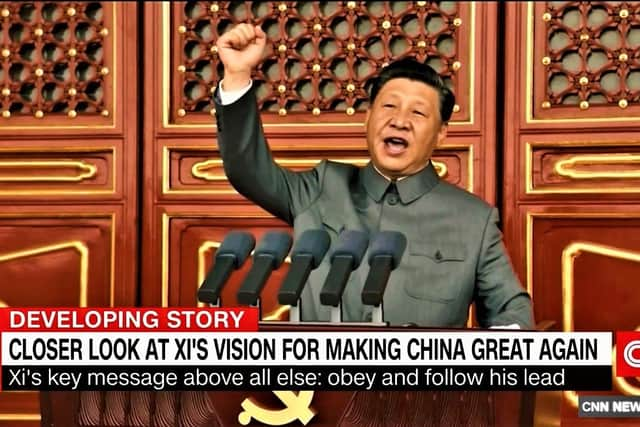Ulster University under renewed pressure over ties to China as government pledges to get tough on eastern superpower
and live on Freeview channel 276
Sophie Richardson, head of Chinese affairs at the global campaign group Human Rights Watch, said there is now a “much stronger sense” in democratic countries that Confucius Institutes, set up within UK universities to promote Chinese culture, are no longer “desirable”.
There are around 30 in the UK, including one in Ulster University, created in 2011 “to develop academic, cultural, economic and social ties between Northern Ireland and China”.
Advertisement
Hide AdAdvertisement
Hide AdDuring his Tory leadership election campaign in summer, Rishi Sunak pledged a shift in attitude towards China on “day one” of his premiership.


“I would close all 30 of China’s Confucius Institutes in the UK,” he said.
"Almost all UK government spending on Mandarin language teaching at school is channelled through university-based Confucius Institutes, thereby promoting Chinese soft power.”
Added to which, conservative think-tank the Andrew Jackson Society recently published a large report into the scale and reach of the UK’s Confucius Institutes, estimating that perhaps £46m in Chinese money has been used to fund them (and that this is likely an underestimate).
Advertisement
Hide AdAdvertisement
Hide AdThe report said that “very few people read Chinese-language sources relating to Confucius Institutes” – but for those who do, such sources make it “clear that Confucius Institutes are designed to aid the Chinese Communist Party’s integration into universities, and to exploit this integration in order to shape how China is understood”.
In light of such renewed scrutiny, Ms Richardson now tells the News Letter: “I do think there’s a much stronger sense amongst some democratic governments that Confucius Institutes are not desirable.
"Even when an individual one appears to be inoffensive, they’re increasingly seen as outposts of an authoritarian government – one with a growing commitment to trans-national repression.”
More at these links:
Pressed on the matter by the News Letter, a UK Government spokesperson said: “As the PM has previously said, China poses the greatest long-term security challenge to the UK economy and more widely, because of the behaviour of the Chinese Communist Party.
Advertisement
Hide AdAdvertisement
Hide Ad“The government is committed to doing more to adapt to its growing impact.”
Ulster University was asked if it anticipates the closure of its Confucius Institute, and whether it will seek to replace it with a new partnership with China.
It was also asked how it reconciles its ongoing ties to the Chinese government, given its rhetoric about supporting human rights.
The university said: “We won’t be commenting on or responding to this.”
Advertisement
Hide AdAdvertisement
Hide AdChinese authoritarianism has hit the headlines afresh this week, thanks to an extremely rare explosion of protests across the country, with some demonstrators reportedly calling for president Xi Jinping to go: an almost unprecedented occurance.
Over the last year, China has ramped up threats to invade the independent island nation of Taiwan (which Beijing insists is part of communist China).
And one year ago, the cross-party House of Commons Foreign Affairs Committee called on the government to recognise that “genocide” is under way against ethnic Uyghur people in Xinjiang province, including “the detention of over a million Uyghur Muslims and other minorities in ‘political re-education camps’” (that’s out of about 12 million Uyghurs thought to be living in the province).
Here are some of the other stories the News Letter has been running on the subject in recent times: